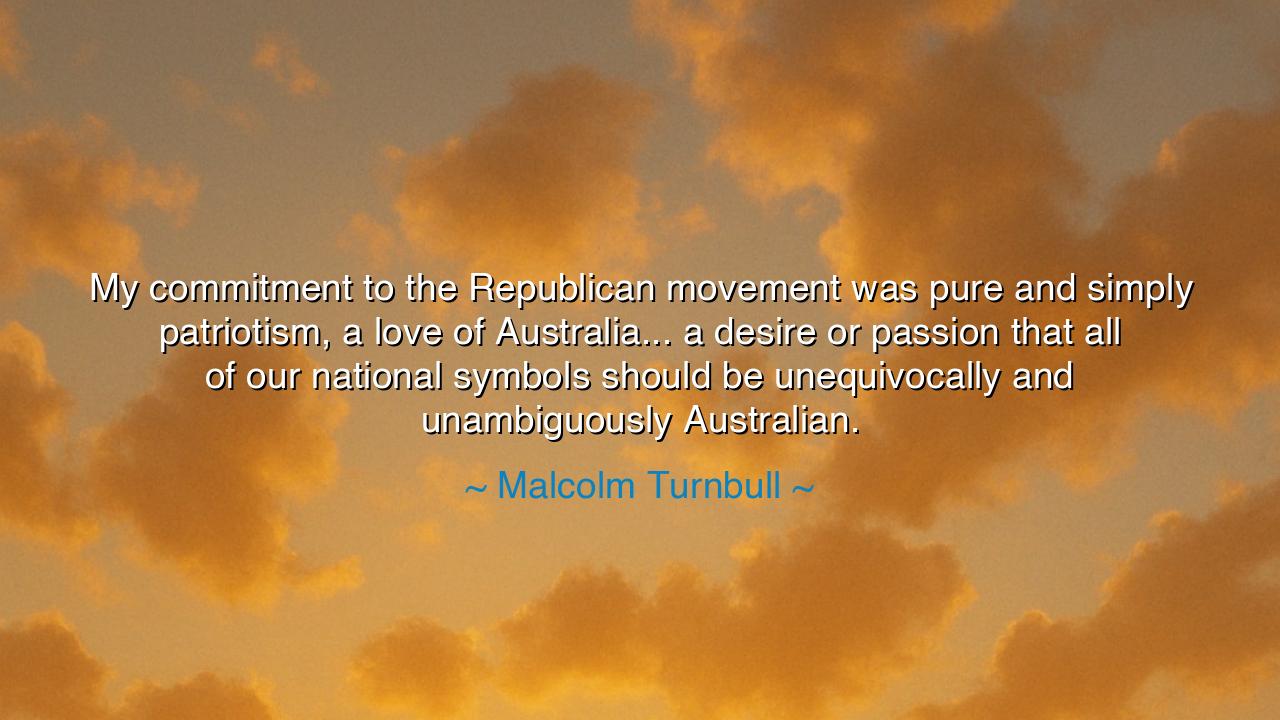
My commitment to the Republican movement was pure and simply
My commitment to the Republican movement was pure and simply patriotism, a love of Australia... a desire or passion that all of our national symbols should be unequivocally and unambiguously Australian.






The statesman Malcolm Turnbull once declared with ardent conviction: “My commitment to the Republican movement was pure and simply patriotism, a love of Australia... a desire or passion that all of our national symbols should be unequivocally and unambiguously Australian.” In these words lies a profound meditation on the nature of patriotism—a devotion not born of convenience or transient popularity, but of deep, principled love for one’s nation. Turnbull speaks of allegiance that seeks to align symbols, institutions, and identity with the enduring spirit of the land and its people. Patriotism, here, is not passive admiration, but active cultivation of the nation’s distinct character.
In the eyes of the ancients, loyalty to one’s polis was inseparable from care for its institutions, customs, and symbols. Cicero and other philosophers argued that the soul of a republic is mirrored in the honor with which its citizens uphold its laws, values, and emblems. Turnbull’s reflection echoes this wisdom: to love one’s country fully is to ensure that its symbols resonate authentically with the people they represent, rather than borrowed or inherited forms that obscure its unique identity.
The origin of Turnbull’s statement lies in his advocacy for Australia to become a republic, severing symbolic ties to the monarchy and embracing a sovereign national identity. This movement sought to affirm that the institutions of Australia—its flag, its currency, its head of state—should reflect the nation’s own character and values. His patriotism was expressed not in rhetoric alone, but in a vision for an Australia that could stand independent, dignified, and unequivocally itself.
History offers comparable moments of symbolic and institutional patriotism. Consider the early leaders of the United States, who shaped the republic after independence. They understood that true allegiance demanded more than loyalty to a new government—it required that symbols, from the flag to the Constitution, embody the nation’s ideals. George Washington and his contemporaries labored to create a polity that reflected their principles, cultivating patriotism through tangible expression in governance and national identity, just as Turnbull sought to do for Australia.
Turnbull’s insight carries moral weight beyond political systems. True patriotism is not mere performance or ceremony; it is a conscious effort to align the nation’s symbols and institutions with the values and aspirations of its people. To revere a flag, a crown, or a monument without understanding or shaping its meaning is to render patriotism hollow. He reminds us that the authenticity of national devotion is measured by how clearly a country’s emblems reflect its own story and spirit.
Consider also the story of India’s independence movement under leaders like Mahatma Gandhi and Jawaharlal Nehru. Beyond the struggle for freedom from colonial rule, they emphasized the creation of national symbols—flags, songs, and civic practices—that resonated authentically with Indian identity. Their patriotism was active and constructive, a labor to ensure that the nation’s outward forms mirrored its values, much as Turnbull’s advocacy sought an unequivocally Australian representation of identity.
The lesson from Turnbull’s words is clear: to love one’s country is to care deeply about its institutions, symbols, and the ways they reflect its values. Patriotism is not blind attachment, but deliberate stewardship of national identity. It calls citizens to engage thoughtfully, ensuring that their nation’s outward expressions—flags, emblems, leadership—truly embody the people’s spirit and aspirations.
Practically, this calls every citizen to participate in the shaping of their nation. Celebrate and honor your country, but also seek clarity, coherence, and authenticity in the symbols and structures that represent it. Advocate for reforms that align national institutions with the collective values of the people. By doing so, one fulfills Turnbull’s vision: a patriotism that is active, principled, and dedicated to a nation unequivocally and unambiguously itself.






AAdministratorAdministrator
Welcome, honored guests. Please leave a comment, we will respond soon